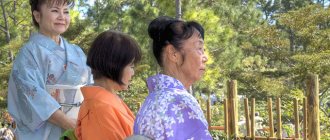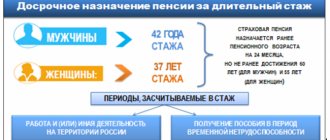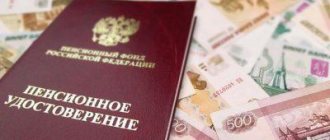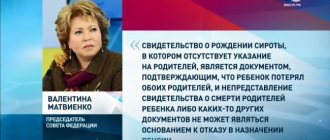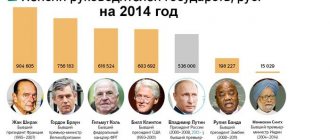What is a non-state pension and who receives it - ask those who have already heard about the upcoming innovations in pension legislation. Before the start of the pension reform, a citizen could influence the amount of future allowance in only one way: find an official job with a good “white” salary and work hard for as long as possible. In Soviet times, working unofficially was completely prohibited not only by law, but also by the moral code: those who did not work were condemned by society. Modernity dictates its own rules: private business, freelancing and “gray” earnings, which are sometimes impossible to get rid of. It’s easier to work as you are than to demand that your employer increase your official salary or look for a new job. Following new trends, the state is trying to improve the law on pensions and make it as convenient and beneficial as possible for everyone.
The legislative framework
The rules and norms of pension provision for Russians are enshrined in the documents:
- Federal Law 173 “On Labor Pensions”;
- Federal Law 75 “On non-state pension funds”;
- Regional laws providing for allowances and benefits.
The Basic Law establishes the rules and amounts of labor pensions. They are calculated based on the contributions that the employer made for the employee during his official work.
Non-state pension funds and personal accounts were replenished until 2015 from employers’ funds (2% from 2002 to 2004 and 6% until 2015 went to the personal account of the future pensioner). At the moment, amendments to the legislation relating to the work of non-state savings funds are being considered.
IS IT WORTH CONTINUE TO WORK AFTER RETIREMENT?
This issue should be considered from several angles. Someone argues that there is no reason to finish work if you really like the work. Others insist that early retirement is the only way to maintain health and energy so that they can start spending time on their own hobbies and recreation.
Opinions "For"
The retirement age is growing all over the world, not only in Russia. This is directly related to the global trend – a general increase in life expectancy. And scientists believe that continuing to work in old age is the best way to maintain psychological/physical health. Moreover, thanks to work, the financial well-being of older employees improves.
Many older people begin to feel useless after finishing their jobs. The habit of working remains forever, so retirees find themselves in new activities, which allows them to get rid of such an annoying feeling.
Opinions “Against”
The disadvantages of working after retirement are often related to psychological aspects. People who remain in a job past the age threshold often suffer from a lack of flexibility and an inability to understand changing professional trends (according to experts). They tend to do what they've done their entire career without considering new technologies in their field. There is often a disrespectful attitude towards young specialists.
Needless to say, intense work has a negative impact on the elderly body? The habit of working hard leads to serious stress, as retirees try to maintain their previous level of productivity, ignoring the fact that work becomes more and more difficult with age. Both mentally and physically.
Non-state pension - what is it?
In essence, these are funds that a citizen himself transfers to his own account in order to calmly save for a comfortable old age. Contributions to the Pension Fund itself can be made by:
- Employers from official salaries;
- Self-employed;
- Individual entrepreneurs.
A person simply cannot bring some of the money and transfer it to his own account for the benefit of the future. But you can participate in co-financing programs. In the near future, this will become easier, as will the assignment of payments from accumulated funds.
In October 2020, bill 722163-7 , containing amendments to Federal Law 75, . Non-state pensions will become more reliable and profitable than state pensions.
The main task of the state is to redirect the vector of the people and explain that people in developed countries do not live on state pensions. This was an advantage of the Soviet Union, along with free education and treatment, as well as all kinds of support for socially vulnerable sections of the population. In modern realities, the state cannot provide pensioners with a comfortable life, so you need to think about future benefits in old age long before the onset of disability.
Advantages of non-state funds:
- The ability to accumulate any amount and subsequently dispose of it at your own discretion;
- The ability to increase the deposit not only with your own money, but also through the interest that the bank charges for the right to use the money until it is withdrawn.
Minuses:
- High risk of losing savings;
- The future pensioner is required to have a high level of consciousness and understanding of the mechanisms of social security.
FORCED RETIREMENT: WHEN IS THIS POSSIBLE?
Mandatory retirement is also called forced retirement. People who have crossed a certain age threshold cannot work in some industries. The reason for this is the specific nature of the employee’s activity.
For example, military service is not only characterized by increased danger, but also requires a high level of physical and psychological characteristics. This includes the field of aviation and maritime affairs. The older the employee, the lower his performance becomes. As a result, the overall productivity of the work unit decreases, which may not suit the employer.
Where to find a non-state savings fund
So, where the State Pension Fund is located is clear. This is a system of district, city and regional branches that meets the requirements for the structure of government organizations. Where to look for NPF?
Today, 58 non-state savings funds are registered in the Russian Federation. They exist as independent units (Electric Power Industry Pension Fund, Gazfond, Lukoil Garant, Soglasie, etc.) and as part of our usual banks (Sberbank, VTB, etc.).
You can transfer your savings to any one, but it is better to choose the one that is more reliable. They differ in the degree of fame, interest accrued, etc. There is one general rule: you can withdraw money only upon reaching retirement age and the official accrual of your labor or social pension.
Why translate? The state fund simply keeps the money and does not use it in any way. Non-state structures use the accumulated funds as their assets, for which they annually index the amount in the account, increasing it by a certain percentage. Even if you do not manipulate your savings at all and do not increase them, they will grow due to the interest on the deposit.
However, despite all the state policy regarding the funded part of pensions, NPFs remain unpopular, and there are relatively few voluntary contributions. Why? Because citizens are not used to investing their earnings in an unknown place for an unknown long period of time. Saving for old age is still not fashionable, although pension reform began back in 2000. Over the course of 20 years, the image of a “typical pensioner” has transformed from an old woman in a headscarf with pennies in her palm into a working and actively resting citizen with goals, hopes and dreams. But Russians still do not trust non-state funds and do not take advantage of the opportunity to save for the future.
Registration of social supplement
Financial assistance is provided by the Pension Fund.
This body considers citizen requests regarding any social transfers, including additional payments to primary care.
Documentation
A citizen who wishes to receive a social supplement must submit the following documents:
- statement;
- passport;
- SNILS;
- employment history;
- a certificate from the department that calculates pensions for length of service (relevant for military pensioners).
The application shall indicate the following information:
- FULL NAME.;
- SNILS;
- citizenship;
- address of actual residence, contact telephone number;
- passport series and number, date of issue;
- information that the citizen is not engaged in labor or other activities and is not obliged to pay insurance contributions to the Pension Fund of the Russian Federation;
- name of the territorial body to which the appeal is sent;
- the obligation to immediately notify the Pension Fund if a citizen gets a job;
- date, signature, surname and initials.
Deadlines
The state surcharge is accrued from the 1st day of the month following the date of filing the application to the Pension Fund.
The bonus will be transferred as long as there is a difference in the level of income of the citizen and the amount of PMP.
State support measures: bill 722163-7
The purpose of the changes is to convince citizens that their pension depends primarily on them, and only then on the state. The basic part of the pension that the state assigns from the budget, although it is regularly indexed, remains far below the subsistence level and can only be considered a pleasant bonus.
What changes are coming in the area of personal savings for future retirement?
- Changing the age when payments can be made. Now this is the age of disability (for 2020 - 56.5 years for women and 61.5 years for men). Under the new project, savings payments can be issued, as before, at 55 and 60 years, respectively.
- Pre-retirement pensioners (people 5 years before the onset of official disability) who are members of the NPF will have the opportunity to receive payments earlier, as benefit recipients do: disabled people, workers of the Far North, people of certain professions.
- Self-employed people, individual entrepreneurs, the unemployed and even ordinary employees and foreigners will be able to freely save for a future pension by adding money to their account. By the way, these payments are not taxed, so you can still apply for a tax deduction for them.
- Even those who have not accumulated IPC and work experience will be able to apply for a non-state pension even if they are of incapacitated age.
Types and amounts of social supplements
To support the most vulnerable categories of the population, a number of subsidies have been legislatively approved.
Additional financial support paid every month (DEMO) is provided to the following groups:
- disabled people and WWII participants;
- disabled people injured as a result of combat operations;
- residents of besieged Leningrad;
- prisoners of concentration camps and fascist prisons;
- widows of those killed during the Second World War or disabled war veterans;
- citizens who served in military units and military educational institutions during the Second World War, but were not part of the active army.
EDV is due to the following categories:
- veterans of labor and wars;
- disabled people;
- citizens who were prisoners of fascism before reaching adulthood;
- persons affected by radiation poisoning.
What additional pension payments are due after age 80? Will there be a double pension for pensioners? Find out here.
There is a practice of providing a basic set of social services (NSS).
It includes free medical care and free travel under certain conditions.
Federal pension supplement
The federal social supplement to pensions is provided to people who receive less than the level of PMP established in their region of residence.
Moreover, the indicated level is less than the value approved on average for the Russian Federation. For example, in the Belgorod region the PMP is 8016 rubles, which is 710 rubles less than the federal one.
When deciding whether a state supplement is needed, you need to calculate the amount of income of the pensioner. This takes into account:
- pensions;
- DEMO;
- EDV;
- other payments, including NSO;
- other measures of material support approved at the regional level.
Calculation examples
In practice, a citizen may be entitled to receive several payments at the same time.
For example, provision for disabled people is carried out on the basis of the provisions of Law No. 181-FZ “On the social protection of disabled people in the Russian Federation”.
In this document, a disabled person of group 3 is entitled to the following support:
- pension in the amount of 4215.9 rubles (excluding length of service);
- set of social services – 1048.97 rubles (established in 2020 and valid until 02/01/2018);
- prosthetics;
- sanatorium treatment;
- other help.
The size of all forms of material support may exceed the established level of PMS.
However, only the size of monthly transfers from the budget is taken into account. The social supplement will be 3,461.13 rubles.
Another situation is when a citizen does not have enough pension points to receive an insurance pension. Reached the age of 65 years. In accordance with the established procedure, I applied to the Pension Fund for the assignment of a social pension.
According to the law, he is entitled to a payment of 5,034.25 rubles, which is below the PMP level. Therefore, as a measure of additional support, a social supplement in the amount of 3,691.75 rubles will be made.
Regional
This additional payment is due to those citizens who live in federal subjects with high costs.
If the PMP exceeds the federal level, the local budget covers the difference.
Regions where PMP is higher than the federal one
- PMP is above the average for the Russian Federation in Moscow and the region, in the Komi Republic, in the Murmansk region and other regions.
- The highest premiums are paid in the northern regions. In Chukotka a.o. The cost of living for 2020 is 19,000 rubles, in the Magadan region - 15,460 rubles, in the Kamchatka Territory - 16,543 rubles. In all of these regions, regional surcharges have been established.
How to receive payments now?
A non-state pension is also available to modern pensioners; you can receive it in one of the following ways:
- Make a one-time payment. This can be done by beneficiaries, persons who have received a social pension (who have not accumulated points and experience) and those whose savings are too small. If you divide savings over 120 or 258 months, the amount received will be lower than 5% of the assigned pension.
- Make urgent payments. The money that the pensioner has in the account will be divided into 120 months (10 years), and the resulting number will become an addition to the official pension.
- Make lifetime payments. In this case, the amount of savings is divided by 258 and paid regularly.
What can an able-bodied person do with a non-state pension?
- You can replenish your NPF account through personal voluntary contributions. In addition, you can transfer money from maternity capital to the account.
- You can transfer your funds from the Pension Fund to a non-state structure. To do this, you need to come to the selected fund and write an application there.
- You can transfer money from one NPF to another. This is also done upon application from the desired fund.
- Wait until retirement age, monitor changes in legislation and plan how to manage your own capital.
Experts tell us whether it is possible to save for retirement on your own
For example, when he works abroad, but wants his pension to continue to be formed in Russia, or to form the pension of a loved one who does not work anywhere. Contributions can also be made by those who work for themselves in order to increase existing pension rights or create them from scratch. The latter, in particular, applies to self-employed people applying professional income tax. By law, they are not required to make contributions to pension insurance, like, for example, individual entrepreneurs or notaries, and form their own pension. Including through voluntary contributions.
But for how many years and in what volume will such contributions have to be made? At the request of Rossiyskaya Gazeta, experts made approximate calculations. Approximate - because everyone’s income is different, and the possibilities for deductions are different.
As Lyudmila Ivanova-Shvets, associate professor of the basic department of the Chamber of Commerce and Industry of the Russian Federation “Development of Human Capital,” reminds, in order to receive an insurance pension, it is necessary to have a certain length of service and a certain number of insurance coefficients (points) by the time you retire. These figures change every year. So, this year you need to have at least 11 years of experience and 9.57 points, and in 2025 - 15 years and 30 points.
“If a person wants to pay contributions at the minimum wage, and if we take 2025 as a base, for which 30 points and 15 years of experience are defined, then he will have to pay contributions for 26 years to earn points, since paying 22% of the minimum wage will give a little more than one point in year. You can earn a maximum of 10 points per year after 2021. This means that in order to earn 30 points, you need to transfer the maximum amount annually for three years. The maximum amount is about 300 thousand rubles per year,” explains Ivanova-Shvets.
And the vice-president of KROS JSC, head of the Pension Literacy project, Maxim Kvasha, draws attention to the fact that the number of pension coefficients and length of service standards until 2025 are currently legally established. “By the time you are ready to retire, the requirements for both length of service and the number of points may increase, and some other exceptions or restrictions may appear. In addition, pension legislation is complex. The size of the pension is also influenced by special working conditions, titles and awards. One thing is indisputable: if a person wants to receive an insurance pension from the state, he needs to take care of its formation,” the expert emphasizes.
In the absence of experience and points, Russians are assigned a social pension. Moreover, it is appointed five years later than the insurance one. In other words, if a person has not saved up for insurance by the time he retires, he will be assigned social insurance in five years. The size of the social pension cannot be lower than the subsistence level in the region where the pensioner lives.
As the Pension Fund explains, in order to start forming a pension on their own, a person must submit an application to the Pension Fund of Russia, thus registering as a payer. This can be done at the Pension Fund client service or by sending an application by mail. Voluntary payments are transferred through the bank using details generated using the Pension Fund of Russia electronic service. It is available in the open part of the Pension Fund website and does not require logging into your personal account. A receipt with the necessary details is also provided at the Pension Fund client services.



